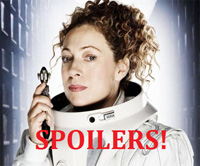 *Major Spoilers for the relaunched Dr. Who*
*Major Spoilers for the relaunched Dr. Who*
Nerds like me know Christmas is Dr. Who season (I guess the UK doesn’t even pretend with “Happy Holidays”). I’m a huge geek for the show, one of those rare popular scifi/fantasy properties that (anecdotally speaking) has a more vocal female fanbase than male one. Which makes a lot of sense to me given the show’s format – the lead is male but an often inaccessible character, and usually accompanied by a woman who’s role is just as large and who’s much easier to identify with.
Some people prefer the last couple series’, overseen by show runner Steven Moffat. From what I can tell, most of those people are dudes. The current Dr. Who has great visual aesthetics, and great villains (though I got so over with The Silence). And it’s got a hero dude cowboy-type (except completely bumbling and actually bad at time travel) Doctor at it’s center. But what it doesn’t have is strong companion characters. Which means no strong women.
In fact, Moffat’s women are weak (even River Song’s lost a lot of her fire as the story’s gone on). I’d go off about The Girl Who Waited – hell, her defining character feature is inaction! But Lindsay Miller already said everything I’d say in a brilliant post about Amy Pond.
So I get to write a love letter to Donna Noble. Brilliant!
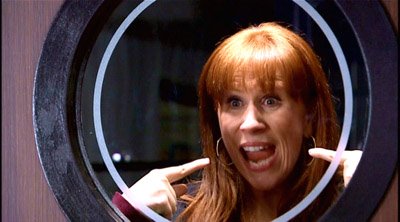
OH. MY. GAWD.
Donna was introduced in series 3’s Christmas special, The Runaway Bride. I thought she was written like a stereotypical nag character, and didn’t understand why my best friend Patrick kept telling me she would be my favorite. Well, I know why now! There are folks who think Donna lapses into nag in series 4, too, but I just don’t see it. Frankly, I wonder how much of that has to do with our difficulty accepting strong willed women. I don’t know exactly where the line is between a caricature of a nag and a powerful woman character, but for me it’s somewhere between The Runaway Bride and series 4.
I’ve always assumed Catherine Tate gave showrunner Russell T. Davies important input in the writing of Donna. She was already hugely successful – The Catherine Tate Show had run for three series on the BBC and won her numerous awards. The Donna of series 4 is an exceptional character – Dr. Who had featured strong women before, but nothing could prepare me for the feminist badassitude to come.
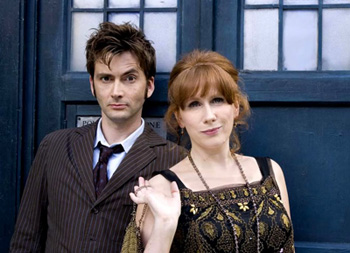 From the beginning, Donna is the Doctor’s equal. Mostly because that’s how she sees herself. So this guy’s a Time Lord with a TARDIS – that doesn’t make him superior. Donna just doesn’t take orders. The Doctor has no choice to accept this, but what’s awesome (and one of my favorite things about my favorite Doctor, David Tennant) is he loves this. Donna’s no nonsense attitude and willingness to challenge him puts a twinkle in the Doctor’s eye and a grin on his face that we haven’t seen at least since he lost Rose. The Doctor’s never had so much fun with a companion.
From the beginning, Donna is the Doctor’s equal. Mostly because that’s how she sees herself. So this guy’s a Time Lord with a TARDIS – that doesn’t make him superior. Donna just doesn’t take orders. The Doctor has no choice to accept this, but what’s awesome (and one of my favorite things about my favorite Doctor, David Tennant) is he loves this. Donna’s no nonsense attitude and willingness to challenge him puts a twinkle in the Doctor’s eye and a grin on his face that we haven’t seen at least since he lost Rose. The Doctor’s never had so much fun with a companion.
Unlike practically every story with a dude and lady lead, Donna has no romantic interest in the Doctor. Zero. I love the Rose/Doctor storyline, but it is a fairly typical romance. And I honestly couldn’t tell you why Martha Jones crushes the Doctor (or why she ends up with Mickey for that matter, besides race, which is messed). Donna finds the idea completely ridiculous (though I actually think the Doctor crushes her, based on his reaction to the last screencap in this article).
Donna and the Doctor aren’t the same – Donna’s great at seeing what the Doctor misses when he’s distracted by all of space and time. But they are equals. And this makes for richer storytelling, with the two leads bouncing off of each other – offering the writers opportunities for more complex story lines and a nuanced, fascinating relationship that’s more real and more thrilling than any of the standard tropes out there.
Yes, I’m saying Dr. Who was a better show when (and precisely because) it was feminist.
I love the specifics of Donna’s brilliance. Martha Jones, the previous companion, was a medical student, and that’s how we were supposed to know she’s smart – she’s over-educated. Donna, on the other hand, is an office temp from Chiswick. She uses the smarts she developed in this job repeatedly in her adventures with the Doctor, consistently baffling him with her insight. Working class girl saves the universe!
 In a media landscape where we too often see women competing for men, Donna’s lady-on-lady friendships rule. Female solidarity is Donna’s default. In her first time travel adventure, “The Fires of Pompeii,” Donna instantly jumps to supporting Evelina, who clearly needs a shoulder to lean on. There’s never any jealousy between Donna and Rose or Martha – and it would have been so easy to write the Rose storyline that way. But no, Donna just reaches out to them and makes them friends right away. Hell, she’s beyond thrilled to see the return of Rose, partly because the Doctor is Donna’s friend and she wants to see him happy. She even befriends the absurdly, stereotypically unintelligent pretty secretary Miss Evangelista in Moffat’s otherwise genius two-parter “Silence in the Library.”
In a media landscape where we too often see women competing for men, Donna’s lady-on-lady friendships rule. Female solidarity is Donna’s default. In her first time travel adventure, “The Fires of Pompeii,” Donna instantly jumps to supporting Evelina, who clearly needs a shoulder to lean on. There’s never any jealousy between Donna and Rose or Martha – and it would have been so easy to write the Rose storyline that way. But no, Donna just reaches out to them and makes them friends right away. Hell, she’s beyond thrilled to see the return of Rose, partly because the Doctor is Donna’s friend and she wants to see him happy. She even befriends the absurdly, stereotypically unintelligent pretty secretary Miss Evangelista in Moffat’s otherwise genius two-parter “Silence in the Library.”
(By the way, I love that the Doctor has companions who look like real women. Billy Piper is gorgeous, and she’s also thin, but in a real person way. I can’t imagine her being cast in Secret Diary of a Call Girl if it was produced in the US, yet she’s actually become a sex symbol. Freema Agyeman is fairly model-y, though a Black companion was certainly an important step. But Catherine Tate is an adult woman, and she’s beautiful, but a far cry from the hungry looking 19-year-olds who jump from the pages of Vanity Fair to the CW.)
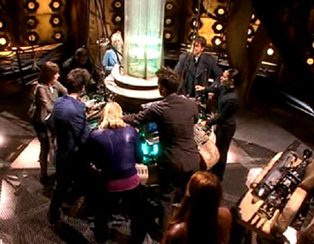 Donna is extraordinarily empathetic. Empathy is a stereotypical female trait, and I get annoyed when it’s pared with a completely weak character. But empathy can also be a sign of personal strength, of confidence in yourself that let’s you see the humanity in others, instead of being about prioritizing others over yourself like it plays out in so much fiction. Donna’s certainly exposed to some pretty raw emotions, especially the song of the Ood. But she uses her compassion and understanding for others as a source of power, to build solidarity, which is ultimately how she saves the universe. Can you imagine the Doctor so happily sharing the burden of flying the TARDIS with all his companions if it weren’t for Donna?
Donna is extraordinarily empathetic. Empathy is a stereotypical female trait, and I get annoyed when it’s pared with a completely weak character. But empathy can also be a sign of personal strength, of confidence in yourself that let’s you see the humanity in others, instead of being about prioritizing others over yourself like it plays out in so much fiction. Donna’s certainly exposed to some pretty raw emotions, especially the song of the Ood. But she uses her compassion and understanding for others as a source of power, to build solidarity, which is ultimately how she saves the universe. Can you imagine the Doctor so happily sharing the burden of flying the TARDIS with all his companions if it weren’t for Donna?
And then there’s the funny. We’re so used to seeing 20-something models with limited experience cast opposite older men who’ve had the opportunity to hone their craft and win over an audience. No wonder some people think women aren’t funny. Catherine Tate and David Tennant are two actor/comedians at the top of their game in series 4. Getting to watch them play off each other is an absolute thrill. I mean seriously, “The Unicorn and the Wasp” (the Agatha Christie episode)? I actually died laughing during the poison scene. I am dead now.
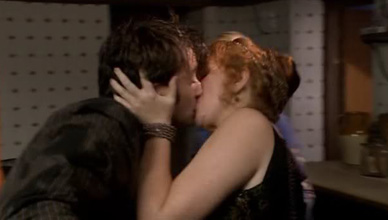
It works cause it’s not romantic
Series 4 ended with the Doctor Donna storyline, when Donna takes on the Doctor’s abilities as well as her own. A story that highlights the strengths as well as the flaws of both characters (a human propensity to violence and the Time Lord’s growing god complex), and shows they, and the Doctor’s whole community of companions, are at their most brilliant when working together. I imagine there’s a feminist critique of the fact that Donna can’t maintain her grasp on all of space and time and must have her mind wiped. But honestly I can’t watch the series 4 finale without weeping straight through, so I’m not the one to bring critique here.
Donna Noble has become my favorite fictional feminist hero, someone who embodies traits I admire and is also hugely entertaining to watch. The Doctor and Donna really had the best of times. The best.

Join the Conversation